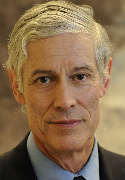 Nitrogen. It makes up three-fourths of the air all around us. It cascades through our environment between land, water and the atmosphere. It is critical to agricultural production that feeds the world. And it is a byproduct of all the fossil fuels we consume.
Nitrogen. It makes up three-fourths of the air all around us. It cascades through our environment between land, water and the atmosphere. It is critical to agricultural production that feeds the world. And it is a byproduct of all the fossil fuels we consume.
In the United States, we put five times more nitrogen into the environment than is deposited or released naturally. That excess nitrogen causes a variety of environmental and health problems – pollution of ground and surface waters, smog, increased emissions of greenhouse gases.
On Oct. 4, 2012, the Freshwater Society and the University of Minnesota College of Biological Sciences will present an important lecture by Purdue University professor Otto Doering on the problem of excess nitrogen. It is an issue that the National Academy of Engineering has called one of the “grand challenges” facing this country in the 21st Century. Register to attend.
Dr. Doering is a professor of agricultural economics and director of Purdue’s Climate Change Research Center. He led a team of scientists that last year produced a major report on the nitrogen problem for the U.S. Environmental Protection Agency’s Science Advisory Board. The report is titled “Reactive Nitrogen in the United States: An Analysis of Inputs, Flows, Consequences, and Management Options.” Download a PDF of the 141-page report.
His lecture will be titled “Excess nitrogen: A Confounding Problem for Energy Use, Food Production, the Water We Drink and the Air We Breathe.”
Dr. Doering will discuss the nitrogen dilemma we face and a range of strategies that could begin to deal with our excess nitrogen problem on the land, in the air and in the water. The lecture will be presented at 7 p.m. Thursday, Oct. 4, in the Student Center theater on the University of Minnesota’s St. Paul campus.